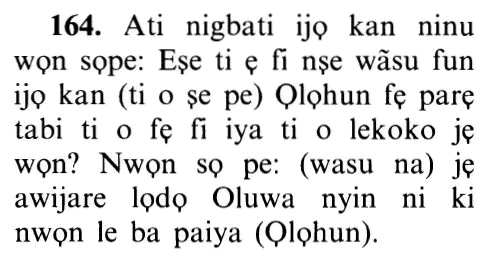7vs164
Select any filter and click on Go! to see results
وَإِذَ قَالَتْ أُمَّةٌ مِّنْهُمْ لِمَ تَعِظُونَ قَوْماً اللّهُ مُهْلِكُهُمْ أَوْ مُعَذِّبُهُمْ عَذَاباً شَدِيداً قَالُواْ مَعْذِرَةً إِلَى رَبِّكُمْ وَلَعَلَّهُمْ يَتَّقُونَ
Waith qalat ommatun minhum lima taAAithoona qawman Allahu muhlikuhum aw muAAaththibuhum AAathaban shadeedan qaloo maAAthiratan ila rabbikum walaAAallahum yattaqoona
Click to play
Yoruba Translation

Hausa Translation
Kuma a lõkacin da wata al´umma daga gare su ta ce: "Don me kuke yin wa´azi ga mutãne waɗanda Allah Yake Mai halaka su kõ kuwa Mai yi musu azãba, azãba mai tsanani?" Suka ce: "Dõmin nħman hanzari zuwa ga Ubangijinku, kuma tsammãninsu, sunã yin taƙawa."
Asbabu n-Nuzuul (Occasions of Revelation)
Those Who breached the Sabbath were turned into Monkeys, but Those Who prohibited Their Actions were saved
Allah says;
وَإِذَ قَالَتْ أُمَّةٌ مِّنْهُمْ ...
And when a community among them said:
Allah said that the people of this village were divided into three groups, a group that committed the prohibition, catching fish on the Sabbath, as we described in the Tafsir of Surah Al-Baqarah. Another group prohibited them from transgression and avoided them. A third group neither prohibited them, nor participated in their action. The third group said to the preachers,
... لِمَ تَعِظُونَ قَوْمًا اللّهُ مُهْلِكُهُمْ أَوْ مُعَذِّبُهُمْ عَذَابًا شَدِيدًا ...
"Why do you preach to a people whom Allah is about to destroy or to punish with a severe torment!''
They said, `why do you forbid these people from evil, when you know that they are destroyed and have earned Allah's punishment!' Therefore, they said, there is no benefit in forbidding them.
... قَالُواْ ...
(The preachers) said:
... مَعْذِرَةً إِلَى رَبِّكُمْ ...
"In order to be free from guilt before your Lord (Allah),''
`for we were commanded to enjoin righteousness and forbid evil,'
... وَلَعَلَّهُمْ يَتَّقُونَ ﴿١٦٤﴾
"and perhaps they may fear Allah.''
for on account of our advice, they might stop this evil and repent to Allah. Certainly, if they repent to Allah, Allah will accept their repentance and grant them His mercy.'
يخبر تعالى عن أهل هذه القرية أنهم صاروا إلى ثلاث فرق فرقة ارتكبت المحذور واحتالوا على اصطياد السمك يوم السبت كما تقدم بيانه في سورة البقرة وفرقة نهت عن ذلك واعتزلتهم وفرقة سكتت فلم تفعل ولم تنه ولكنها قالت للمنكرة " لم تعظون قوما الله مهلكهم أو معذبهم عذابا شديدا " أي لم تنهون هؤلاء وقد علمتم أنهم قد هلكوا واستحقوا العقوبة من الله فلا فائدة في نهيكم إياهم ؟ قالت لهم المنكرة " معذرة إلى ربكم " قرأ بعضهم بالرفع كأنه على تقدير هذا معذرة وقرأ آخرون بالنصب أي نفعل ذلك " معذرة إلى ربكم " أي فيما أخذ علينا من الأمر بالمعروف والنهي عن المنكر " ولعلهم يتقون " يقولون ولعل لهذا الإنكار يتقون ما هم فيه ويتركونه ويرجعون إلى الله تائبين فإذا تابوا تاب الله عليهم ورحمهم .
"وإذ" عطف على إذ قبله "قالت أمة منهم" لم تصد ولم تنه لمن نهى "لم تعظون قوما الله مهلكهم أو معذبهم عذابا شديدا قالوا" موعظتنا "معذرة" نعتذر بها "إلى ربكم" لئلا ننسب إلى تقصير في ترك النهي "ولعلهم يتقون" الصيد
أي قال الفاعلون للواعظين حين وعظوهم : إذا علمتم أن الله مهلكنا فلم تعظوننا ؟ فمسخهم الله قردة .
I'raab - grammatical analysis of the Qur'an
«وَإِذْ» عطف على إذ الأولى في الآية السابقة.
«قالَتْ أُمَّةٌ» فعل ماض وفاعل.
«مِنْهُمْ» متعلقان بمحذوف صفة لأمة والجملة في محل جر بالإضافة.
«لِمَ» ما اسم استفهام في محل جر باللام ، والجار والمجرور متعلقان بتعظون. والجملة الفعلية لم.
«تَعِظُونَ» الجملة مقول القول.
«قَوْماً» مفعول به.
«اللَّهُ مُهْلِكُهُمْ» لفظ الجلالة مبتدأ ومهلكهم خبر والهاء مضاف إليه والجملة مقول القول.
«أَوْ مُعَذِّبُهُمْ» عطف.
«عَذاباً» مفعول مطلق.
«شَدِيداً» صفة.
«قالُوا» الجملة مستأنفة.
«مَعْذِرَةً» مفعول لأجله أي وعظناهم لأجل المعذرة أو مفعول مطلق : لنعتذر معذرة. وبالرفع خبر لمبتدأ محذوف تقديره موعظتنا معذرة ..
«إِلى رَبِّكُمْ» متعلقان بمعذرة. والجملة المقدرة مقول القول.
«وَلَعَلَّهُمْ» لعل واسمها وجملة «يَتَّقُونَ» في محل رفع خبر وجملة (و لعلهم) معطوفة.
